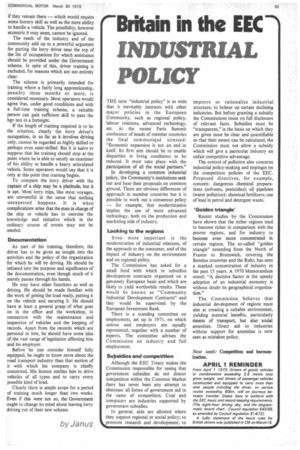'Britain in the EEC UST POLICY
Page 53

If you've noticed an error in this article please click here to report it so we can fix it.
THE term "industrial policy" is so wide that it inevitably interacts with other major policies in the European Community, such as regional policy, labour relations, advanced technology, etc. At the recent Paris Summit conference of heads of member countries the final communiqué stressed: "Economic expansion is not an end in itself. Its first aim should be to enable disparities in living conditions to be reduced. It must take place with the participation of all the social partners."
In developing a common industrial policy, the Community's institutions seek out and base their proposals on common ground. There are obvious differences of approach in member countries but it is possible to work out a consensus policy — for example, that modernization implies the use of more advanced technology, both on the production and marketing side of industry.
Looking to the regions Even more important is the modernization of industrial relations, of the approach to the consumer, and of the impact of industry on the environment and on regional policy.
The Commission has asked for a small fund with which to subsidize development contracts organized on a genuinely European basis and which are likely to yield worthwhile results. These would be known as "Community Industrial Development Contracts" and they would be supervised by the European Investment Bank.
There is a standing committee on employment, set up in 1971, on which unions and employers are equally represented, together with a number of experts. The committee advises the Commission on industry and full employment, Subsidies and competition Although the EEC Treaty makes the Commission responsible for seeing that government subsidies do not distort competition within the Common Market there has never been any attempt to eliminate all forms of government aid in the name of competition. Coal and computers are industries supported by government subsidies.
In general, aids are allowed where they support regional or social policy; to kzromote research and development; to improve or rationalize industrial structure; to bolster up certain declining industries. But before granting a subsidy the Commissions insist on full disclosure of relevant facts. Subsidies must be "transparent," ie the basis on which they are given must be clear and quantifiable so that their extent can be calculated, the Commission must not allow a subsidy which will give a particular industry an unfair competitive advantage.
The control of pollution also concerns industrial policy-making and impinges on the competition policies of the EEC. Proposed directives, for example, concern: dangerous chemical preparations (solvents, pesticides); oil pipelines (water pollution); chemical fertilizers; use of lead in petrol and detergent waste.
'Golden triangle' Recent studies by the Commission have shown that the richer regions tend to become richer in comparison with the poorer regions, and for industry to become even more concentrated in certain regions. The so-called "golden triangle" extending from the North of France to Brunswick, covering the Benelux countries and the Ruhr, has seen a marked concentration of industry in the past 15 years. A 1970 Memorandum noted: "A decisive factor in the speedy adoption of an industrial economy is without doubt its geographical organization."
The Commission believes that industrial development of regions must aim at creating a suitable environment, yielding material benefits, particularly means of transport, but also social amenities. Direct aid to industries without support for amenities is now seen as mistaken policy.
Next week: Competition and harmonization.
APRIL 1 REMINDER
From April 1 1973: Drivers of goods vehicles or combinations exceeding 35 metric tons gross weight, and drivers of passenger vehicles constructed and equipped to carry more than nine people including the driver, on service routes exceeding 50km, will on journeys between member States have to conform with the EEC hours and record-keeping requirements. (The eight-hour driving day, and the diagrammatic record chart. Council regulation 543169, as amended by Council regulation 514174 A fuller statement of the hours rules for British drivers was published in CM on Marchl:."










































































































